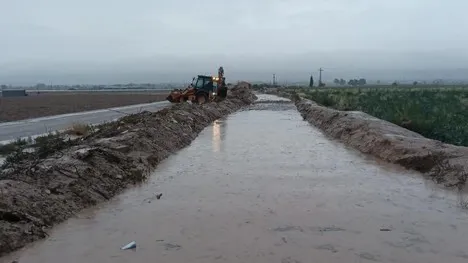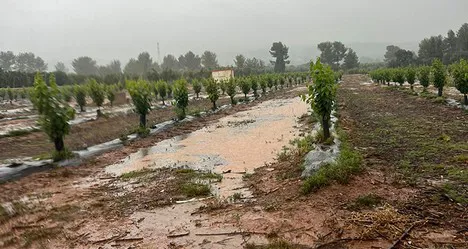The Spanish Levante, especially the Region of Murcia and the Region of Valencia, have been recording abundant rainfall after months of extreme drought. In general, and despite the fact that there have been floods in some towns, the producer organizations of both regions consider these recent rains good for the field, although they won't put an end to the lack of water throughout the territory.

According to the head of the Climatology Laboratory of the University of Alicante, Professor Jorge Olcina, springtime DANA rainstorms are not as strong as those of September and October because the Mediterranean Sea is less warm.
In the Region of Murcia, with the exception of some stormy episodes such as those recorded in Casas Navarro, with 51 mm of rainfall, or Cieza, with 52 mm of rainfall, or in the area of Canteras, which recorded between 90-95 mm, the prospect is that the rains will be beneficial for the crops and contribute to an improvement of the soil for the remaining productions, as reported by the Union of Small Agricultural Producers and Ranchers (UPA).
It is expected that the rainfall will continue for the rest of the week, and hoped that it will not cause serious damage and that it will contribute to irrigate the fields and fill the reservoirs.

In the Region of Valencia, the first estimates from the Valencian Association of Agricultural Producers (AVA-ASAJA) and the Unió de Llauradors also consider the rains "beneficial, in general terms, although damage has been reported in some farms and there are concerns about the duration of the storms, as excessive humidity and lack of solar radiation could have a negative impact on stone fruits, seasonal vegetables, citrus and grapes."
When it comes to irrigated crops, "producers had started irrigating three months earlier than last year and were consuming 40% more water due to the drought, so these rains should help reduce their production costs, refill the reservoirs and aquifers and clean the trees. The negative side of this is that in the areas where excessive rainfall has been recorded in a short period of time, especially the central regions and deep areas near watercourses and ravines, there are already some flooded fields and damage to agricultural infrastructure."
The storm has interrupted the harvesting of stone fruits (peaches, nectarines, plums, apricots, etc.) and seasonal vegetables (onions, potatoes, artichokes, broccoli, etc.). "In those crops that were now optimally ripe and ready to be harvested, we foresee crop losses due to cracked fruit skin, rotting and fungal attacks. Also, if it continues to rain for too many consecutive days, citrus crops could be affected by fruit setting issues, as already happened last spring."
